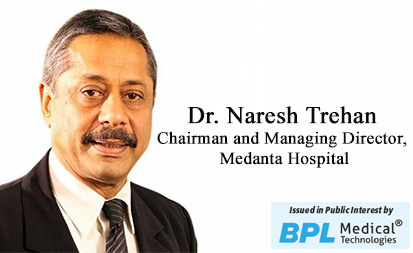COVID-19 and Heart Patients – FAQs
Renowned Cardiac Surgeon Dr. Naresh Trehan - Medanta explains how the virus affects heart patients and answers some of the most frequently asked questions: Does Coronavirus effect Heart patients more severely? Are they more

Renowned Cardiac Surgeon Dr. Naresh Trehan – Medanta explains how the virus affects heart patients and answers some of the most frequently asked questions:
- Does Coronavirus effect Heart patients more severely? Are they more vulnerable to catching the Virus?
Compared with a Healthy Heart, people with Heart conditions are at a greater risk of getting very sick (or dying) because of Coronavirus disease. Of these Heart conditions, some are at even higher risk, these include:
- Heart failure
- Heart transplant
- Complex Adult congenital heart disease
- Blockage of arteries and those with Angina
- High pressure in arteries of the Lung (Pulmonary artery Hypertension)
- Heart Rhythm irregularities
- People who have been hospitalized with heart disease in the past 6 months
- What kind of Lifestyle should Heart patients follow? Especially during the pandemic?
Remain Physically active and avoid sitting for prolonged hours at your desk to prevent heart diseases, take regular breaks and avoid sitting more than 10 hours a day at your desk.
Avoid stress and negative thoughts that have been experienced due to a multitude of problems in the Pandemic period, such as isolation due to Lockdown, work-from-home conditions. It is important to stay calm and be positive.
Yoga and relaxation techniques along with deep breathing/pranayama can help maintain balance.
Retain communication with Family and Friends.
Maintain stock of all your regular medications and take them on a regular basis as prescribed.
Measure your weight daily and remain as close to your ideal body weight (between18-5-24.9). This helps you to keep your diet in control.
- How can one reduce the risk and prevent heart diseases?
Follow the Simple 7:
- Manage Blood pressure
- Control Cholesterol
- Reduce Blood sugar
- Stay Active
- Eat better
- Lose Weight
- Stop Smoking
- With the ongoing Pandemic, what are the guidelines that you wish to give to Heart patients?
- Do everything possible to avoid exposure to the coronavirus, and follow expert advice after vaccination. Staying home and away from other people you don’t live with is critically important — especially if you are in your 60s or older.
- Remain focused on the safety basics: wearing a mask when you’re out, hand-washing with soap and water for at least 20 seconds, not touching surfaces and cleaning surfaces diligently.
- People with heart disease and cardiovascular risk factors to get vaccinated as soon as possible.
- Stay in contact with your health care team, eat well, be physically active and take all your medications as prescribed, including ACE inhibitors and ARBs. (Make sure you have at least a 30-day supply of each of your medicines for heart disease.) If you aren’t already doing so, make note of your symptoms each day so you can better manage your condition
- Remember to take your medications as prescribed, stay in contact with your health care team, and be sure to eat well and be physically active.
- Stay well connected with Family and friends through Phone and Video calls and avoid getting socially isolated
- And be sure to seek emergency help right away if needed.
- What should caregivers keep in mind while taking care of Heart patients during the Ongoing COVID 19 Pandemic?
Cardiac patients are at higher risk of complications if they get infected with the Coronavirus. This makes the role of caretaker complicated — especially when we are expected to live with coronavirus for some time to come. Helping a loved one is an incredibly rewarding experience but it comes with challenges.
- About 25% of people who are infected with coronavirus show no symptoms but are still contagious. While as a caregiver you may feel fine, it is still possible to infect the vulnerable cardiac patient.
- Observe utmost care from exposing yourself to risk of infection from outside.
- Taking extra precautions of masking, distancing and hand sanitization while handling a cardiac patient.
- Keep adequate stock of regular medications, medical supplies and healthy foods.
- Make sure to understand your patient’s cardiac status and associated conditions, medication information and schedule, doctors’ phone numbers,
- If symptoms of COVID-19 appear (e.g., Fever, dry cough and Shortness of breath) seek help from the local doctor for advice
- Head to your nearest emergency room severe COVID-19 symptoms appear. These include – severe shortness of breath, low blood pressure, increased heart rate (Pulse rate above 100 bpm), dehydration, profound weakness, high fever.
- Designate a backup caregiver
- What are the challenges in treating COVID-19 patients with heart disease?
- There can be a delay in the diagnosis of heart attacks (Acute coronary syndromes) because the symptoms of elevation of blood markers (Troponins) and even ECG may show abnormalities during COVID due to myocarditis.
- Patients with CAD will be at an increased risk of Plaque rupture because of virally induced systemic inflammation.
- There are pro-coagulant effects of systemic inflammation that may increase the likelihood of clotting in stents leading to higher chances of repeat attacks.
- In confirmed Covid 19 patients with low-risk heart attacks, Clot busters should be used and Cardiac Catheterization used only as Rescue PCI.
- Dedicated Infrastructure and processes are needed for the management of COVID in ACS
- Need dedicated Cardiac units with more than one Cath Lab. One of them needs to be dedicated to the management of suspected or confirmed COVID 19 cases with acute coronary syndromes.
- Many drugs used to treat COVID-19 can have adverse cardiovascular effects. Commonly used Azithromycin and HCQS can lead to QT interval prolongation making people vulnerable to sudden cardiac death. Lopinavir-Ritonavir can lead to heart blocks. Tocilizumab can lead to hypertension.
- What are the causes that lead to the onset of Cardiac problems in young adults?
The following are the causes of heart diseases in young adults:
- Smoking.
- Substance abuse or excessive alcohol intake
- Poor diet and lack of exercise.
- Obesity
- High blood pressure.
- High cholesterol with a family history of cardiovascular disease
- Type 2 diabetes.
- Certain Congenital conditions such as Hypertrophic Cardiomyopathy and Long QT syndromes
- Can Coronavirus later cause heart diseases such as Heart attack or Arrhythmias?
Yes, Coronavirus can damage the Heart muscle and can cause Heart rate irregularities.
- The symptoms related to Arrhythmias are:
- Feeling your Heartbeat rapidly or Irregularly
- Feeling Light Headed
- Chest discomfort
- Severe Fatigue
- Symptoms of Heart Failure-
- Fatigue
- Shortness of breath,
- leg swelling
- Frequent urination at night.
- Sudden cardiac arrest
- Venous and arterial Thromboembolism
- What are your Viewpoints on Video consultations being a part of patient care especially during this pandemic?
- Virtual visits and Video Consultations were most useful during the active phase of the pandemic when there were absolute restrictions to travel even for medical purposes, especially during the second wave of Pandemic in India.
- It was least appropriate in very sick/critical patients, new referrals, patients requiring physical examination to determine management, and patients who are deteriorating or experiencing frequent symptom change
- Specific tasks that were reported as impossible or challenging during a virtual visit included assessing fluid status, vital signs, reviewing medication list, auscultation, ECG, response to exercise
- The limitations were – language barrier, poor connectivity, Cognitive impairment and Hearing impairment.






